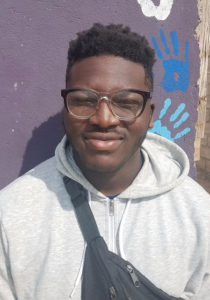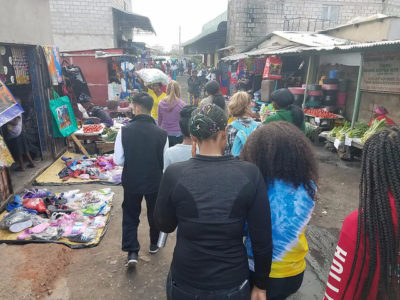 Saturday, June 30 – Today was our first Saturday in the beautiful country of Zambia, so we went to this place called the Dutch Market. The Dutch market is a place were all kinds of people go to sell and trade all kinds of goods. When we arrived there were a lot of people there and a bunch of shops selling goods. You could smell the food from the gate; it smelled magnificent.
Saturday, June 30 – Today was our first Saturday in the beautiful country of Zambia, so we went to this place called the Dutch Market. The Dutch market is a place were all kinds of people go to sell and trade all kinds of goods. When we arrived there were a lot of people there and a bunch of shops selling goods. You could smell the food from the gate; it smelled magnificent.
When we arrived at the entrance we had to pay 5 kwacha per person. Once we entered I went over to one of the vendors close by the entrance. He was selling all sorts of items from wooden carvings to native clothing. I’d seen one of the shirts and knew I wanted it. Danyelle was in front of me talking to who I believed to be his mother and they were bartering over the price of one of the shirts. The mother said, “It costs 200 kwacha but I will sell it to you for 170,” and Danyelle said, “I don’t know, 120?” Then they went back and forth until they agreed upon the price of 110. When her son approached me he tried to sell it to me for the same price saying, “120 kwacha,” not knowing that I overheard the previous conversation ending on 110 kwacha for the shirt. To make a long story short, I ended up buying the shirt for 115 kwatcha, 5 more than what Danyelle had bought it for, but I really didn’t care. I know how hard it is getting customers to buy things, and I just wanted to help.
 We went around looking at different shops, and I went to one shop with Jordan and Chayse. We were looking at rings and I tried on one ring that got stuck on my hand. After 5 minutes of trying to remove it I gave up and asked the vendor how much it cost because I didn’t have a choice. I had to buy it. I kind of knew something was amiss because the guy was smiling when my hand got stuck. Personally, I think the rings where a setup. I asked him and he told me 50 kwacha. Due the the predicament I was in he had the advantage so I couldn’t really bargain with him. Afterwards, Jordan and I just walked around looking at different vendors and getting pulled in by them. Every five steps we took someone pulled us into their shop. When we didn’t want to buy an item, we’d make up different ways to get out of it quickly. Jordan even made up a effective method called “pretending you got a phone call.” It worked well! I saw Tony with a wooden toy car that he bargained down from 150 to 30 kwacha. Chayse bargained a bracelet from 100 to 20 kwacha. Then Drew also bargained a wristband from 45 to 30 kwacha. The fact that we had to bargain is crazy because if you transferred this all to U.S. dollars none of us spent more then $60. All these things would normally be much more expensive in the United States. After about 30 minutes of looking around in the front of the market we finally looked in the back and I saw a ring that I really wanted, but in the back you can’t bargain as much as you might want to. So when I saw the ring I bought it immediately for the low price of 50 kwacha.
We went around looking at different shops, and I went to one shop with Jordan and Chayse. We were looking at rings and I tried on one ring that got stuck on my hand. After 5 minutes of trying to remove it I gave up and asked the vendor how much it cost because I didn’t have a choice. I had to buy it. I kind of knew something was amiss because the guy was smiling when my hand got stuck. Personally, I think the rings where a setup. I asked him and he told me 50 kwacha. Due the the predicament I was in he had the advantage so I couldn’t really bargain with him. Afterwards, Jordan and I just walked around looking at different vendors and getting pulled in by them. Every five steps we took someone pulled us into their shop. When we didn’t want to buy an item, we’d make up different ways to get out of it quickly. Jordan even made up a effective method called “pretending you got a phone call.” It worked well! I saw Tony with a wooden toy car that he bargained down from 150 to 30 kwacha. Chayse bargained a bracelet from 100 to 20 kwacha. Then Drew also bargained a wristband from 45 to 30 kwacha. The fact that we had to bargain is crazy because if you transferred this all to U.S. dollars none of us spent more then $60. All these things would normally be much more expensive in the United States. After about 30 minutes of looking around in the front of the market we finally looked in the back and I saw a ring that I really wanted, but in the back you can’t bargain as much as you might want to. So when I saw the ring I bought it immediately for the low price of 50 kwacha.
Around 12:00 pm I was hungry, so I went to check out the food vendors and it smelled great over there. The first thing I saw was the chicken being grilled and immediately I went over there to check it out. It looked wonderful and I couldn’t wait to try it! I waited 20 minutes, and when it was ready it looked and smelled so good. The chicken looked golden brown with a crispy skin and smelled so fresh – like it was made with love. When I sat down and took a bite of the chicken it was the most wonderful taste ever! I even got another plate for the road. Next thing I knew it was time to go. I really enjoyed looking at and buying the Zambian food, as well as learning more about the culture.
Later that day we took a tour around downtown Lusaka with the Chikumbuso gap-year scholars. They showed us what they did for fun and what downtown Lusaka looks like. Even though we were stuck in traffic for half an hour it was still a fun experience to see and hang out with them. Overall today was a good day interacting with Zambian people and seeing and learning what they do every day. Also being able to see more of Zambia really opened my eyes to what many people in Zambia are– very hardworking men and women.
Chinonso N., E.L. Haynes Public Charter School
